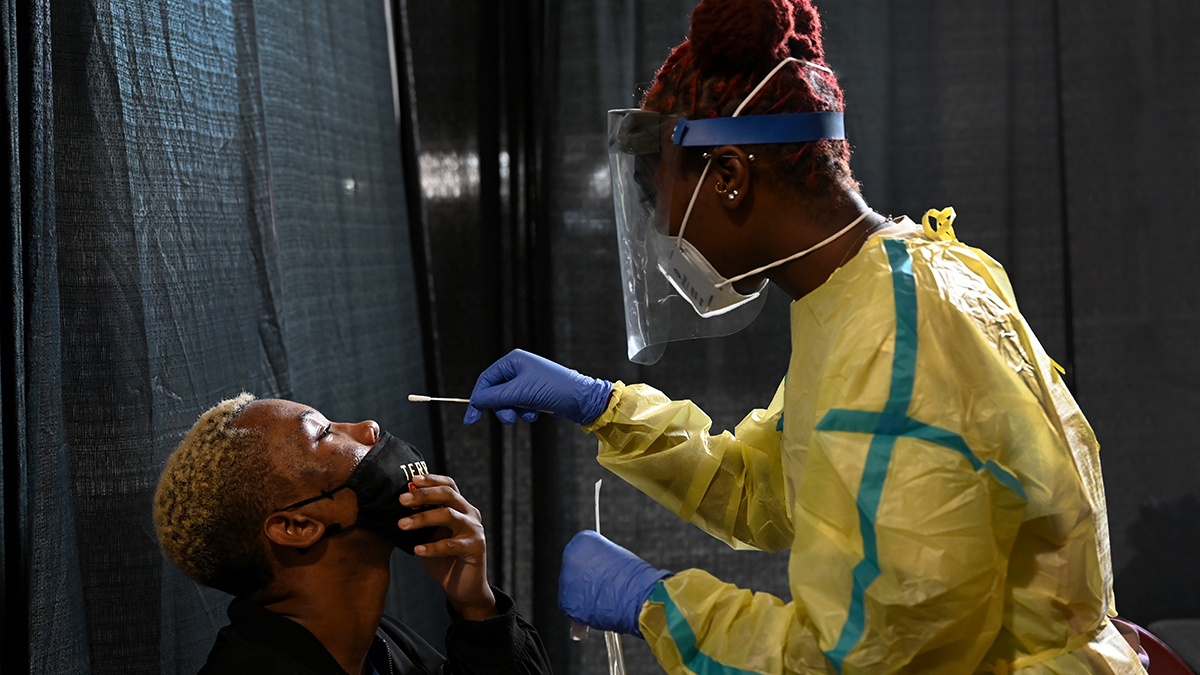For months the experts have warned us that the impact of the pandemic will deepen before vaccines can dramatically slow the spread — and some of the metrics are reflecting that assessment.
January has become the deadliest month for COVID-19 patients in the U.S. since the pandemic began. The Biden administration’s coronavirus task force said the country is likely to surpass 500,000 deaths by February.
In an effort to ensure Americans have access to health insurance during the pandemic, President Joe Biden on Thursday is set to sign an executive order to reopen Affordable Care Act insurance marketplaces.
The Biden administration has also promised to send more vaccines to health departments, including D.C.’s, which expects 15% more doses for the next three weeks.
Bars and restaurants in Maryland will be able to remain open past 10 p.m starting Monday, Feb. 1, the governor announced Thursday, citing progress in the fight against COVID-19.
Restaurants will still have to operate at no more than 50% indoor capacity.
DC Says Vaccine Race, Ethnicity Data is Currently Lacking
DC Health Director LaQuandra Nesbitt says the District is working on providing data on the race and ethnicity of vaccine recipients amid concerns that communities of color and those living in economically disadvantaged neighborhoods are getting left out.
Nesbitt says D.C. isn’t currently publishing the race and ethnicity data it has because quality is lacking.
“We've had a tremendously challenging time having vaccine providers actually collect race and ethnicity data,” Nesbitt said.
According to Nesbitt, 28% of doses have been given to individuals who are white and non-Hispanic. Another 15% were administered to Black or Hispanic individuals. But the remainder — more than than half of doses — were given to recipients whose race was listed as unknown or other.
With so many recipients listed as unknown, the existing data wouldn’t give an accurate picture of the vaccination programs, Nesbitt said.
D.C. will start listing the available data next week while noting the caveats and trying to improve information collection, Nesbitt said.
COVID-19 Cases Surge Among Children in DC Area
Doctors at Children’s National Hospital in D.C. are seeing surges of children diagnosed with COVID-19.
There’s been an uptick in acute, recent COVID-19 infections. At the same time, more children are being diagnosed with multisystem inflammatory syndrome in children (MIS-C), a condition where the immune system has an exaggerated and harmful response to the virus.
The syndrome is rare but can develop weeks after coronavirus symptoms clear up and affect major organs, potentially leading to heart failure or even death.
“We’re seeing the MISC-C bump from Thanksgiving,” Dr. Bernhard Wiedermann said. “Some of them are very, very sick with life-threatening illness.”
It’s rare for children to have any serious coronavirus symptoms, but about 2.5 million kids nationwide have tested positive for the illness.
Clinical trials are now underway to see how children 12 and up react to coronavirus vaccines, but data for children 11 and younger may not be available more than a year.
Younger children appear less likely to spread the virus, leading Dr. Wiedermann to say reopening schools with precautionary measures could be done safely in the D.C. region.
Wearing a mask, staying six feet apart, avoiding indoor crowds and frequent hand washing are still the best ways to keep your family safe from COVID-19, Wiedermann said.
Thousands of Teachers to Get Shots as Coronavirus Vaccine Roll Out Continues
Coronavirus vaccines are slowly becoming more widely available, but getting an appointment can be a difficult and sometimes confusing process.
Prince George’s residents waited hours for shots Wednesday at the Prince George's Sports and Learning Complex.
But over the weekend, thousands of Northern Virginia educators and school employees should finally get their shots.
Fairfax and Prince William County Public Schools announced additional appointments will be available as soon as Thursday. This comes just days after coveted appointments were canceled, due to supply shortages.
Fairfax County expects to give out thousands of vaccines between Thursday and Sunday. Prince William County Schools hope to give out 2,400 shots over the weekend.
The entire Commonwealth of Virginia is getting a boost with its vaccination plan: Gov. Ralph Northam is encouraging hospitals not to hold second doses in reserve. That will free up 40,000 more shots, statewide.
Virginia's COVID-19 restrictions that were set to expire at the end of this month will be extended until the end of February, including mandated face masks, public gatherings limited to 10 people and a modified stay-at-home order from midnight until 5 a.m.
In Montgomery County, Maryland, health officials have teamed up with Johns Hopkins to begin vaccinating eligible residents and public school employees this week.
On the first day of vaccinations for D.C. Public Schools staff, about 460 doses were put into arms. D.C. has scheduled vaccine appointments for more than 3,500 public and charter school teachers.
“I’m pleased we’ve been able to prioritize teachers,” Bowser said.
D.C. is planning some improvements to its vaccine portal: The site will no longer show providers who are already completely booked up, nor will it ask questions about insurance information. The city has also hired more call takers, but the easiest way to book an appointment is vaccinate.dc.gov.
What the Data Shows
Virginia recorded 3,505 new coronavirus cases and 77 deaths Thursday. That marks Virginia’s third-largest jump in deaths ever reported. Previous records were set on Sept. 15 when 84 cases were recorded and this Tuesday when 79 deaths were reported in the state.
D.C. reported 267 new cases and seven additional deaths on Thursday. Maryland had 2,190 new cases and 40 deaths.
Seven-day averages increased slightly for the second day in D.C. (from 209 to 217) and Virginia (from 3,411 to 3,461). In Maryland the seven-day average increased by four cases to 2,033.
For two weeks new infections in the D.C. area have been trending downward after record-breaking highs were reported in mid-January, but this new turnabout in the seven-day average could signal the end of the region’s winning streak.
Hospitalizations are still dropping, however. If new infections surge again, we can expect hospitalizations to increase, too. Currently, there are 2,439 patients with confirmed cases of COVID-19 in the hospital in Virginia, 1,636 patients in Maryland and 253 hospitalized in D.C.
Vaccination Portals by County
As vaccinations in our region ramp up, here's a look at local portals residents can use to sign up for vaccination appointments or sign up to receive alerts.
- Washington, D.C. signups– vaccinate.dc.gov
- Maryland signups – www.marylandvax.org/ and covidvax.maryland.gov
- Virginia information – www.vdh.virginia.gov/covid-19-vaccine/
- Montgomery County – www.montgomerycountymd.gov/covid19/vaccine/
- Prince George's County – www.princegeorgescountymd.gov/3730/COVID-19-Vaccination
- Howard County – www.howardcountymd.gov/Departments/Health/MM-Alerts-and-Recalls/COVID-19-Vaccine
- Anne Arundel County – aahealth.org/covid-19-vaccine-faq/
- Fairfax County – www.fairfaxcounty.gov/health/novel-coronavirus/vaccine
- City of Alexandria – www.alexandriava.gov/health/info/default.aspx?id=119270
- Loudoun County – www.loudoun.gov/covid19vaccine
- Prince William County – coronavirus.pwcgov.org/vaccine-information/ & VDH
To get a better idea of when you'll be eligible to receive a vaccine, use our tool below.
Local Coronavirus Headlines
- Bars and restaurants in Maryland will be able to remain open past 10 p.m starting Monday, Feb. 1, the governor announced Thursday. Restaurants will still have to operate at no more than 50% indoor capacity.
- Nursing homes and rehabilitation facilities in the D.C. region are still working to convince some of their employees that it's safe to get the COVID-19 vaccine.
- There are growing concerns the Jan. 6 insurrection at the U.S. Capitol was also a superspreader event for the men and women defending the building.
- Maryland Gov. Larry Hogan outlined plans to put the infrastructure in place to speed up COVID-19 vaccinations when a higher volume of doses becomes available. Six mass vaccination sites are planned, including one at Six Flags America.
- Georgetown University says it will discipline medical students who received COVID-19 vaccines though they were not eligible to receive them.
- Just as millions of Americans are rolling up their sleeves for a COVID-19 vaccine, the News4 I-Team has learned the outgoing Secretary of Health and Human Services made it much harder to get compensated for the most common vaccine injury.
- COVID-19 vaccine supply shortages forced Inova Health System to cancel first-dose appointments for people in Northern Virginia’s Group 1B, a group that includes employees of Fairfax County Public Schools.
- D.C.’s child care workers are asking officials not to push back their COVID-19 vaccinations.
- Maryland Gov. Larry Hogan says school districts should resume in-person learning by March 1 or face legal action, which the state teacher's union says is a threat to educators.
- Police officers who risked their lives during the deadly riots inside the U.S. Capitol have been hailed as heroes. On Friday, Chief Robert Contee said some of those heroes have since tested positive for COVID-19.
- Maryland Gov. Larry Hogan's proposed economic relief package would provide $750 for qualifying families if approved by state legislators.
- Maryland reported its first two confirmed cases of the U.K. variant of COVID-19.
- The stress of the pandemic is a grind. A data analysis from the American Dental Association shows a surge in cases of teeth grinding, clenching and cracking during the COVID-19 crisis. The increases are striking and potentially costly and painful for sufferers.
- A professor is using the trust Black Americans have in barbers to make them more comfortable with taking the COVID-19 vaccine.
- A rapid antigen test might seem like a great idea when you're in a hurry and don't have time to wait a few days for results, but those tests are really designed for people with COVID-19 symptoms and in asymptomatic patients can deliver false positive results.
- COVID-19 numbers continue to paint a dire picture for Black Americans, and there is an ongoing effort in the Black community to increase testing.
Reopening Tracker
- A judge upheld Montgomery County, Maryland's ban on indoor dining.
- D.C. has lifted its ban on indoor dining, but libraries and recreation centers are still closed.
- Virginia instituted a curfew and a stricter mask mandate.
- Maryland tightened restrictions on businesses, bars and restaurants.
- All Smithsonian museums and the National Zoo are closed because of rising COVID-19 cases.
- Hours before some Fairfax County students were set to return to in-person learning, the school district said that they needed to delay the plan.
- Courts throughout Maryland remain partially shut down due to the pandemic.
- Prince George's County tightened restrictions and required masks to be worn outdoors.
How to Stay Safe
Anyone can get COVID-19. Here are three simple ways the CDC says you can lower your risk:
- Wear a snug-fitting mask that covers your nose and mouth.
- Avoid being indoors with people who are not members of your household. The more people you are in contact with, the more likely you are to be exposed to COVID-19. If you are indoors with people you don’t live with, stay at least six feet apart and keep your mask on.
- Wash your hands often, especially after you have been in a public place.



